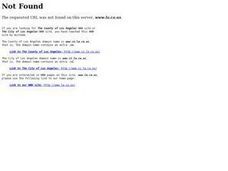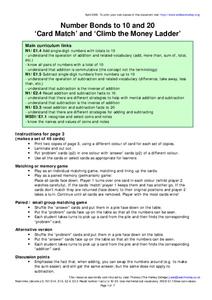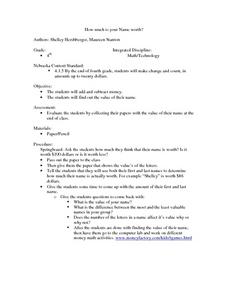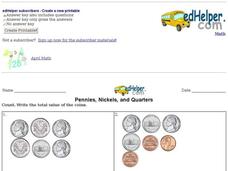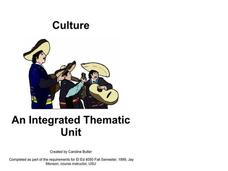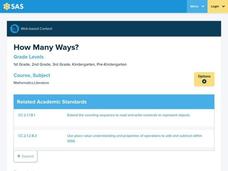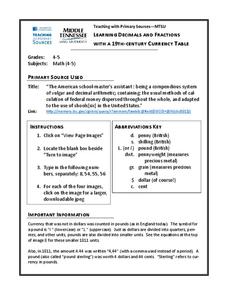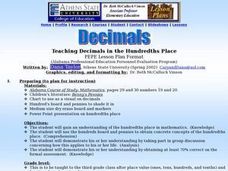Fuel the Brain
Money (Nickels & Pennies)
Your class knows the value of coins, but can they identify which coin is which? With images of different coins, your youngsters will find out how much money Xavier and Destiny have and what they can buy.
Curated OER
Pioneer Currency in Utah: Have you got change for 5?
Eleventh graders examine why pioneer society needed a uniform medium of exchange -- not so much among themselves, but for use with non-Mormon suppliers and California immigrants.
Curated OER
Money
Second graders show combinations for $1.00. In this dollar combinations instructional activity, 2nd graders use nickels, dimes, and quarters to model and count combinations equaling $1.00.
Curated OER
Number Bonds To 10 And 20
In this number bonds to ten and twenty worksheet, learners working in pairs begin to read the instructions to and play the two games 'Card Match' and 'Climb the Money Ladder'.
Curated OER
How Much is Your Name Worth?
Students identify the value of each coin type and then use a code to assign each letter of the alphabet to the value of the coins. They add coin combinations to determine the value of their name.
Curated OER
The Odyssey of a CoinC
Learners create a fictitious newspaper article to document the travels of an ancient Greek coin. They evaluate the economic conditions that existed in ancient Greece and analyze the impact Alexander the Great had on the ancient world.
Curated OER
Nickels and Pennies
In this counting money worksheet, students find the value of the coins and count the coin with the greater value first. Students then complete the penny and nickel chart using the word problem.
Curated OER
Texas Quarter Drawing
Students recognize the U.S. penny, nickel, dime, and
quarter by design and denomination and study the historical figures depicted on the coins. They study simple Texas symbols and choose
one to draw in a design for a Texas Quarter.
Curated OER
Sing a Song of Coinage
Young scholars examine the Tennessee state quarter. They discuss Tennessee's musical heritage, examine all of the coins and as a group, create a song about coins or money. They also complete worksheets pertaining to the lesson.
Curated OER
Basic Equivalencies
First graders manipulate coins to show equivalencies between pennies and dimes. Given specific values, 1st graders model the specified amounts by using pennies and dimes. Through use of a computer assisted trading coins, students...
Curated OER
Pennies, Nickels and Quarters
In this coin worksheet, learners count pennies, nickels and quarters shown in sets and writ the total value of the coins. Worksheet is labeled as a sample from a subscription site.
Curated OER
What are Quarters Made of?
Students study the meaning, symbolism, and value of U.S. coins,
especially the quarter. They l research why in 1965 the U.S. Mint decided to
change the metal composition of the quarter to copper coated with zinc. In addition, they...
Curated OER
Math Bargains
First graders use real coins or concrete models of coins to solve problems involving the purchase of items. They use cons and simulate going to a bargain store to purchase items. Students record the total cost of items. Pupils make a...
Curated OER
Defining Culture
Second graders define the term culture and are exposed to a variety of cultures from around the world. They read books, play Native American games, develop a class book that examines their own culture and, after examining currencies from...
Curated OER
Counting Dimes, Nickels, and Cents
In this coins worksheet, learners count up the total number of dimes, nickels, and pennies in each problem. Students complete 25 problems total.
Pennsylvania Department of Education
How Many Ways?
Students estimate the amount of money they have in groups of pennies, nickels, and dimes. In this money lesson plan, students then count up the amounts they have and exchange money amounts.
Curated OER
Decimals and Fractions
Students learn about using decimals and fractions by referring to a 19th century currency table. In this decimals and fractions lesson plan, students discuss converting pounds to coins and how they relate to fractions and decimals.
Curated OER
It's In Your Pocket
Students examine federal powers. In this U.S. Constitution lesson, students explore the powers of Congress to coin money. Students also study the meaning of the symbols on U.S. coins.
Curated OER
Are You Money Smart?
Learners figure out and discuss the irony of this coin-centric poem. They also practice persuasive letter writing, and identify and count coin/money values.
Curated OER
Coin Collections
Learners explore why coin collectors would find American Eagle coins important additions to their collections. They generate a list of items that they collect or save. They identify reasons that people collect different items.
Curated OER
Quarters
In this quarters worksheet, students read about quarters and their value, then write con amounts of given sets and complete a cost/change activity.
Curated OER
Decimals: Teaching Decimals in the Hundredths Place
Third graders examine place value in the hundredths place. They use decimals and money for understanding.



